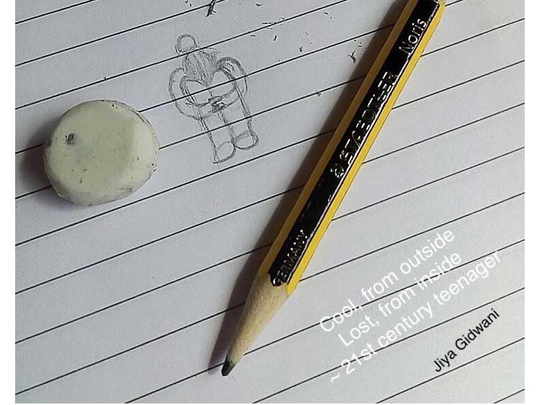
Dubai
Don’t poke the bear.
Especially when the bear is your teenage son or daughter, who is experiencing not just awkward physical changes to their body, but a raging cocktail of hormones, issues with their self-esteem, moods, attention span, impulse control, and a full-blown identity crisis.
It’s a lot to handle for someone whose frontal lobe – the decision-making part of the brain that controls impulses and thinks through the consequences of actions – is still developing.
Dr Saliha Afridi, clinical psychologist and managing director at Lighthouse Arabia, a Dubai-based community mental health and wellness clinic, said: “The brain is under major construction during teenage years. These years are called ‘the window of sensitivity’ and great vulnerability.”
Dubai-based student Jiya Gidwani, 13, has had her fair share of teen stress – from peer pressure, and managing rumours that often surround teen life, to meeting expectations or dealing with “fake friends”.
At the worst phase of stress, she has had suicidal thoughts and even hurt herself. Self-harm is common among teenagers, according to Gidwani. She has seen friends also cut themselves.
She said: “We start wearing full sleeves so that no one starts noticing what we are doing.”
One in 12 young people, mostly girls, engage in self-harming such as cutting, burning or taking life-threatening risks, according to a 2011 study published in The Lancet medical journal.
The UK-based National Health Service (NHS) website states that self-harm is a way of coping with or expressing overwhelming emotional distress, and can also be seen as a cry for help.
Picture this: A boy, who until the age of 10 or 12, was obedient, respectful and compliant. Suddenly, the conforming behaviour disappeared. A simple request to clean up his room would be met with defiance, with the boy preferring to let things accumulate rather than giving in to what his parents wanted.
Worried that the situation was getting out of control, his parents decided to send him abroad to a boarding school, hoping it would instil some discipline. That did not help much either – a year later, he was back and still having behavioural problems.
That is when his parents reached out to Dr Andrea Tosatto, a clinical psychologist at Synergy Integrated Medical Centre Dubai.
He said: “There are always many co-factors that affect a teenager’s behaviour. The best thing to do is to prioritise communication.”
But it’s easier said than done. It can often be a struggle to communicate, because parents, by virtue of their position, are blocked off by their teens. And when they try to use tough love, that can backfire too.
Research shows that parents who mistake their teen’s vulnerable emotions for negativity may place them at greater risk for developing delinquent behaviours.
A 2015 study, published in the US-based Journal of Youth and Adolescence, reviewed data from 220 parents and their teens. Researchers found that when teens thought their parents’ reactions to their anger was stronger and more negative than their parents had meant it to be, they became even more aggressive. Using statements like, “get over it” or “too bad”, caused children to feel dismissed and neglected.
But it’s important for parents to distinguish whether a teenager is just acting out or is developing a mental disorder.
Dr Afridi said: “The distinguishing factor is that the difficulties start to have a significant negative impact on their academic, social, and emotional functioning. This means, for instance, they didn’t just forget to turn in some assignments but are now barely passing any classes. They have isolated themselves, and don’t have any friends that they connect with or enjoy spending time with, and so on.”
This was the key, in a case involving a boy, 15, who suddenly became anorexic.
Dr Tosatto said: “Because of the growth and bodily changes that teenagers experience, they can feel a bit like the ugly duckling. This child started reading self-help books about training and became obsessed. That nervous energy around his self-image was not healthy and led to anorexia. It was connected with the transformation of the body – he couldn’t accept the way he was becoming.”
Cases of anorexia often relate to an underlying emotion of anger and a feeling of loss of control, according to Dr Tosatto. This becomes worse during one’s teens, because of a lack of control over one’s own body.
A US-based Harvard University study found that up to two-thirds of underweight 12-year-old girls considered themselves to be too fat. By the time they turn 17, only three out of ten girls are not on a diet, and up to eight out of ten are unhappy with what they see in the mirror.
Adolescence represents a pivotal stage in the development of a positive or negative body image. Everything, from societal expectations to toys, the media, and one’s peers, sends teenagers cues on how they should look. The pressure can be debilitating, especially if teens face situations where they are bullied or mocked for their choices.
But surrounding yourself with good friends in a transient society like the UAE can also be a challenge for expat teenagers.
Selma Yanik, a child and youth psychotherapist at German Neuroscience Centre in Dubai, said: “Many families move every single year, due to financial reasons, and struggle to find an affordable and good quality school, according to the curriculum preferred. Developing and maintaining friendships during the process of personality shaping are a big struggle, especially for teens.”
A boy, 15, came to Dr Valeria Risoli, a clinical psychologist with Dubai physiotherapy and family medicine clinic, because of his inability to socialise with other children. Not only had he moved from a different country, his parents had recently separated.
Dr Risoli said: “Before moving countries, he apparently did not have any major problems at school or at home so they thought that the only reason behind his current difficulties was his shyness and a phase of adjustment to the new environment and school.”
She analysed that not only was his father unavailable and lacking emotional intelligence, his mum was exhausted by their recent separation and by several difficulties she had to face with her son.
“Teenagers tend to become more impulsive and also aggressive when facing distress and unhappiness as their emotional and behavioural regulation might be reduced because of the hormonal changes, as well.”
Research published by the US-based Harvard Medical School shows that human brain circuitry does not mature until the early 20s. So if schools and parents do not work together to address their issues during this pivotal period in their lives, they could grow up to become dysfunctional adults.
Dr Afridi said: “With the main task of adolescence being identity formation, teenagers will typically separate themselves from their nuclear families, and… experiment with different identities, develop their own likes and dislikes, have their own opinions and beliefs, and cultivate a sense of self, which may or may not be different from their family. All the while that the child is developing an identity, their body and mind is undergoing major reconstruction — resulting in fatigue, hormonal urges and anger outbursts. If the parent does not understand all the difficulties that the child is going through, they may be quick to judge and reprimand the child, and the child will feel misunderstood and misjudged — the generation gap becomes a generational valley.”













